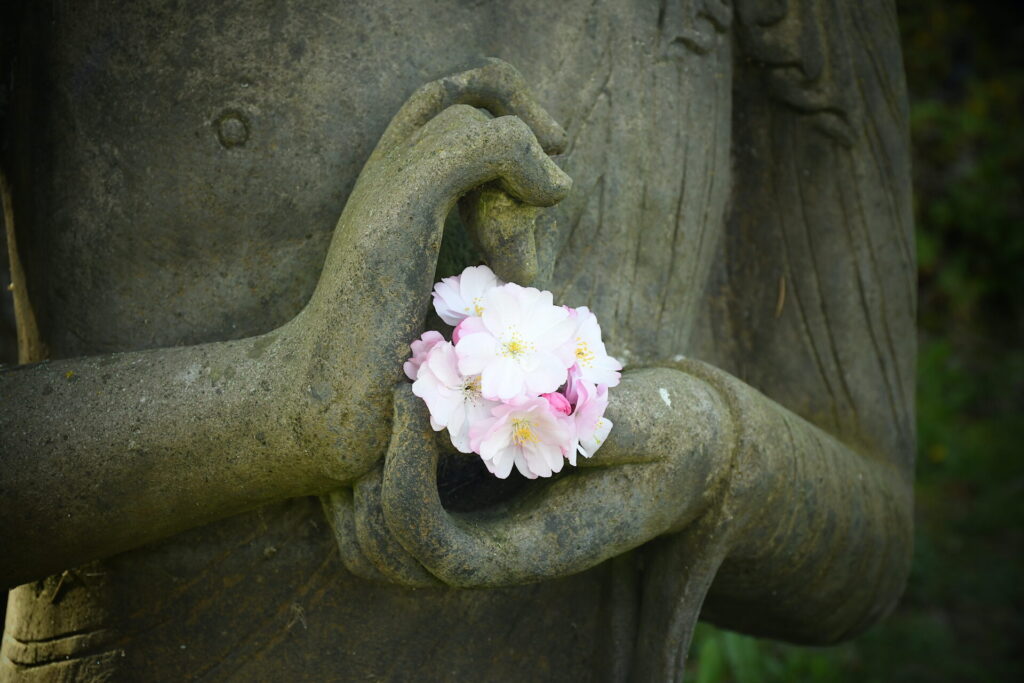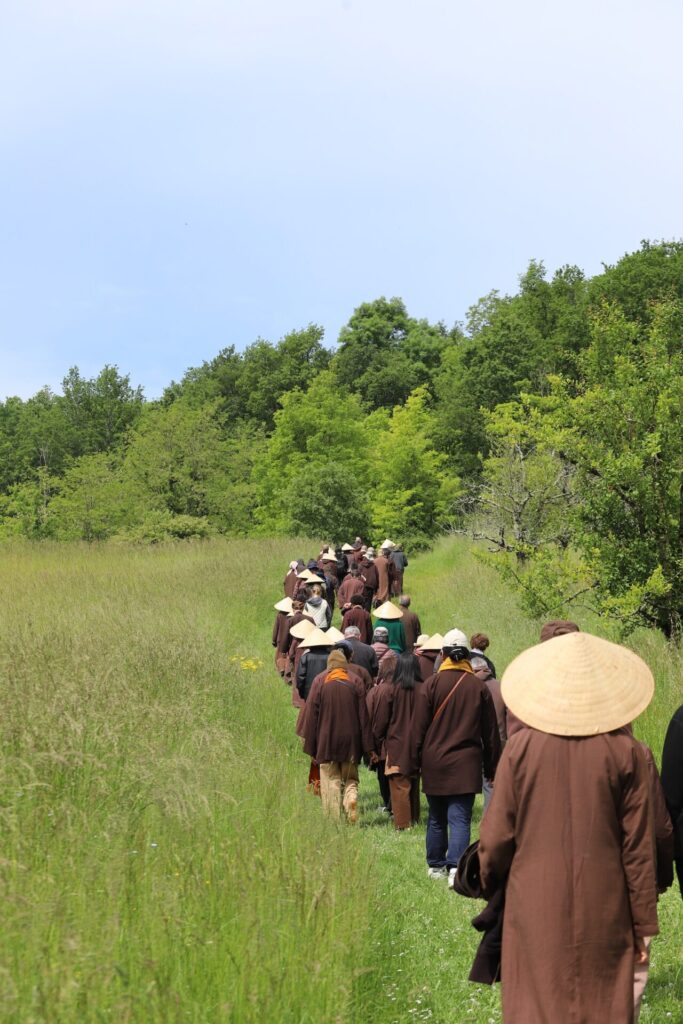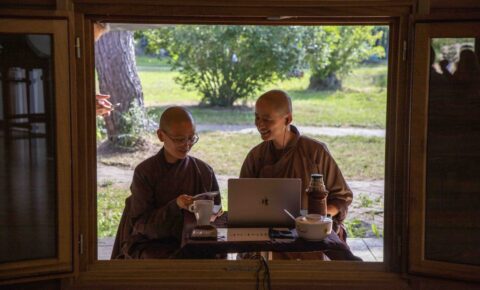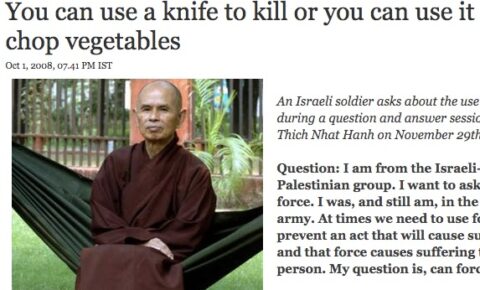In this article, Dharma Teacher Annie Mahon, based in Washington D.C, shares her deep practice of cultivating fierce compassion in the face of fanaticism. She offers insights on how this powerful quality can transform both our hearts and our world, guiding us toward the creation of sustainable communities that care for all.
The Four Noble Truths and the Nature of Suffering
In the midst of these challenging social and political days, what keeps me out of despair are the most basic teachings of the Buddha. In his very first teaching after enlightenment, the Dhammacakkappavattana sutta, the Buddha shared the Four Noble Truths. The first truth is that difficult situations, like the one we are in, are real and completely unavoidable. In the second and third noble truths, he lets us know that we have some ability to influence these difficulties by considering how we habitually feed suffering and how to stop doing that.
The Buddha knew that we have free will and the ability to put an end to suffering. Sometimes I forget that.
Embracing our Suffering
In the mindfulness trainings, also aimed to diminish suffering, it is suggested that we become more aware of suffering and not turn away from it. In this moment, at least here in Washington D.C, I’m finding it pretty easy to be aware of suffering. Every time I look at my phone or have a conversation, it’s usually about suffering being experienced throughout the world. I think we all can agree on the reality of suffering.
What we do after we witness suffering is where we have some freedom and possibly the ability to alter the situation.
When we watch, listen or read about suffering, we may give rise to feelings of anger and hatred toward the ones causing the suffering. And we might also give rise to feelings of care, love, and protection for those who are experiencing the suffering. Both of these are valid responses to suffering and both deserve our mindful compassion. For me, the question is which of those seeds do I continue to water? The seeds of hatred and anger or the seeds of love and care? And what happens when I water each type of seed?
Cultivating Boundless Love
When I’m able to keep my attention on my sadness, grief, and broken heartedness and stay connected to my deepest intention that all beings be well, I water the seeds of love and care. Practicing this cultivation of boundless love means I consider each person who is being targeted by ICE (Immigration and Customs Enforcement), each person who has lost a beloved job and vocation, those losing health care coverage and other needed benefits. I can touch the suffering of every family separated by war and violence, and the many transgendered people whose existence is being questioned, and rights being lost. This brings sadness and compassion in me and motivates me to act in ways that protect and care for those beings.
This kind of care is not the same as pity. We all will face pain and fear, if not now, then some day in the future. When I was diagnosed with leukemia, I remember people saying, “I’m so sorry you’re sick.” And while I appreciated their care, I knew that none of us escapes suffering and someday they too would very likely have a life-threatening illness.
I pay attention to caring for others as a fellow traveler on this often difficult path of life, not as a separate observer of their pain.

Choosing Fierce Compassion over Anger
When I allow myself to fixate on anger and hatred toward those causing the suffering, I generate more hatred, fear, and disconnection in myself and toward other beings. It’s easy for me to let this habit energy take over, and when I do, my actions don’t move me toward beneficial actions because I am preparing for war in my body and mind.
Thay has said, and we have experienced, that “the more powerful your mindfulness and concentration becomes, the greater your freedom becomes.” With mindfulness, we can keep bringing our attention back to the ones who need our support and focus on love and care, and still be motivated to stop the harm. We will call out and resist words and actions that cause harm because we care so much. “Just as a mother loves and protects her only child at the risk of her own life” is how the Discourse on Love describes this kind of fierce compassion. Actions coming from hatred generate more hatred. Actions coming from compassion generate more compassion.
While we work to heal and transform our own suffering, we also work to heal and transform our collective suffering. We say no to the abusive and bullying behavior of those in positions of power, while holding deep love for ourselves and all our relations. We meet the colonizers with fierce compassion that does not accept abuse and also recognizes the humanity within us all.
Dharma Teacher and songwriter, Joe Reilly
The Role of Community and the Path of Love

This practice – returning again and again to love and care rather than anger and hatred – can be made easier and magnified by practicing with the spiritual and social support of a community. Thay often said that the next Buddha may be the sangha because we need the power of community to make real transformation. Practicing to generate fierce compassion together, our communities can and will become forces for healing and will provide deep wells of love and care, supporting us and many many others.
This is the secret that the Buddha discovered – we do have free will and we can develop the capacity to notice when we are watering seeds that lead to more anger and hatred, and when we are watering seeds that will generate more love and care. We get to choose. This is the crucial practice that the Buddha called Wise Effort, the kind of effort that can heal our precious world.
The path of love is not a path of weakness as some would have us believe. Boundless love is the path of strength because it includes everyone and everything in the cosmos, including ourselves. Nothing is left out. Dr. Martin Luther King, Jr. told us that “Love is the most durable power in the world” and I believe that.
Your task is not to seek for love, but merely to seek and find all the barriers within yourself that you have built against it.
Rumi
My practice right now is to focus on taking down all the barriers to love in my heart, the habits of anger and fear that arise so easily when my friends and so many other beings are suffering so greatly. To keep my focus on fierce and compassionate resistance and build and sustain communities that care for all. The more I can transform fanaticism and intolerance in my heart, the more I can resist and transform it in the world.





Share Your Reflections